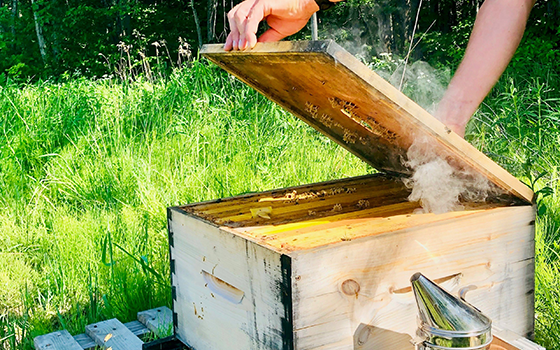Pollinators like bees and butterflies are invaluable to our food chain. As they move from flower to flower gathering nectar, they carry the pollen needed to fertilize the plants. It is estimated that nearly 80% of all flowering plants need pollinators to produce fruit and seeds, and that one out every three bites we take is the result of pollination. Our meals would be much less varied if these precious insects weren’t part of our lives. Besides working hard to pollinate plants, bees produce delicious honey, which we love to use in a variety of dishes.
Some interesting facts about bees and honey:
– To produce 1 kg of honey, bees must visit 1 million flowers and make 50,000 trips to gather the nectar.
– It takes the bees 7,000 hours to produce 500 g of honey.
– 15 mL (1 tbsp.) of honey contains the life’s work of 12 bees.
Why are our honey bees dying?
Over the past few years, you may have heard media reports about an increase in bee mortality. There are a number of causes contributing to this increase: Like us, bees need a varied diet. To stay healthy, they must have access to trees, shrubs and herbaceous plants, both native and cultivated. Increasingly, the wilderness is being converted into farmland, diminishing plant diversity and impoverishing the food supply that bees rely on to maintain a heathy population. Restricted to a less varied diet, they are more prone to diseases that can be fatal.
Large-scale farming is synonymous with pesticides and can also spell disease and even death for bees. Like most animals, bees suffer from the effects of climate change, which can upset the balance of their natural habitat.
To counter this increase in bee mortality, we can all do our part to improve the lives of our pollinator friends. Here are a few ideas to help increase their chances:
Plant flowers
In addition to beautifying your surroundings, flowers add variety to the pollinators’ pantry.
Eat organic
By choosing organic products, you are reducing the use of neonicotinoids, pesticides that are harmful to bees and banned in organic farming.
Garden conscientiously
Since pesticides are harmful to pollinators and bees, avoid using them in your garden.
Buy locally produced honey
By supporting local beekeepers, you encourage their efforts to protect bees by providing them with a suitable hives and habitats.
Set up an insect hotel
Set up a bee hotel to attract pollinators and give them place to nest, which will in turn will help your garden flourish.
You even build your own and get the whole family involved. https://espacepourlavie.ca/blogue/en/a-do-it-yourself-insect-hotel
References:
Canadian Association of Professional Apiculturists (2020). Canadian Association of Professional Apiculturists Statement on Honey Bee Wintering Losses in Canada.
https://capabees.com/shared/CAPA-Statement-on-Colony-Losses-2020.pdf
Food and Agriculture Organization of the United Nations (2020). Honey.

